★★★½
“Leon, if Matilda had been adopted by Stansfield, instead of Leon.”
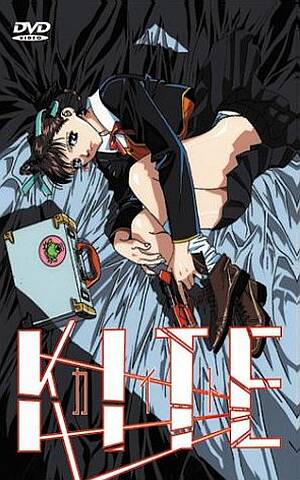 Concerns about some content here means Kite has had a tortuous release in the West. First time out, in 1998, it was shorn basically of all explicit sexual content: given the potentially underage nature of the animated heroine, Media Blasters didn’t want to be hit with a kiddie porn charge – laughable though that may seem for a “cartoon”! – and played it very safe. Subsequent releases over the next six years restored first much, in the “Director’s Cut”, then all (“Special Edition”) the footage, but the OAV* might just work better without the sex. It’s hardly as if I finished it and thought, “Y’know, what this really needs is some sequences of the heroine getting molested.”
Concerns about some content here means Kite has had a tortuous release in the West. First time out, in 1998, it was shorn basically of all explicit sexual content: given the potentially underage nature of the animated heroine, Media Blasters didn’t want to be hit with a kiddie porn charge – laughable though that may seem for a “cartoon”! – and played it very safe. Subsequent releases over the next six years restored first much, in the “Director’s Cut”, then all (“Special Edition”) the footage, but the OAV* might just work better without the sex. It’s hardly as if I finished it and thought, “Y’know, what this really needs is some sequences of the heroine getting molested.”
Because the story is interesting enough on its own. Sawa is a teenage assassin, basically mind-controlled by her foster father, Akai: he’s a cop who uses her to mete out vigilante justice to paedophiles, etc. [This is ironic given their relationship, the nature of which even the edited version makes fairly clear.] She meets a young man, Oburi, in much the same situation, and their growing relationship threatens to disrupt the status quo of everyday slaughter. And, “slaughter” is the word, since Sawa’s weapon of choice is bullets that first penetrate the victim, then explode. Cue more irony: in America, even animated teenage sexuality is entirely verboten, but teenage, paint-the-walls-blood-red carnage? Bring it on.
The action is certainly intense, well-animated and directed, though perhaps excessive. Even after falling from a building, through the road, down to the subway – then being blown up, flying back into the air and blasted through an apartment window, some BandAids are apparently all the medical attention Sawa requires. This conflicted badly with the gritty realism of the story, and I also hated the doodling sax soundtrack, which sounded like something rejected by Abel Ferrara for Driller Killer. Otherwise, though, it’s generally impressive and stylish, with a downbeat approach that is refreshing, as well as some spectacularly messy violence.
* = Original Animation Video, a common “straight to video” anime format. It’s only 50 minutes, about standard length for such things. A live-action version, directed by Jorge + Javier Aguilera, produced by Rob Cohen & Anant Singh, was announced earlier this year, but no release date has been scheduled. And No Doubt’s video for Ex-Girlfriend borrowed heavily from Kite – the bathroom assassination is re-staged, almost shot-for-shot, as this video shows.
Dir: Yasoumi Umetsu
Star (voice): Kotomi Naruse, Shingo Oyamada, Goro Shibusawa, Tatsuo Matoba






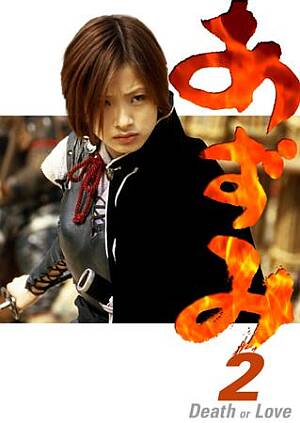 I went into this with low expectations, based on some scathing reviews and the lack of Ryuhei Kitamura, whose directorial style made the first such a joy. I’m pleased to report then, that this surpassed expectations, with some nice imagination and a bevy of action heroines (including Kuriyama, whom you’ll know as Gogo Yubari from Kill Bill, Volume 1), as well as the expected high body-count. It follows on loosely from the original, but heads in a slightly different direction; our heroine is still intent on her mission, but is diverted by a wandering samurai, part of a rogue gang, who reminds her of Nachi, her childhood friend she had to kill at the opening of the original film.
I went into this with low expectations, based on some scathing reviews and the lack of Ryuhei Kitamura, whose directorial style made the first such a joy. I’m pleased to report then, that this surpassed expectations, with some nice imagination and a bevy of action heroines (including Kuriyama, whom you’ll know as Gogo Yubari from Kill Bill, Volume 1), as well as the expected high body-count. It follows on loosely from the original, but heads in a slightly different direction; our heroine is still intent on her mission, but is diverted by a wandering samurai, part of a rogue gang, who reminds her of Nachi, her childhood friend she had to kill at the opening of the original film.
 The picture on the right probably does a better job of explaining what Cutey Honey is about than I ever could; part-girl, part nano-technology, rebuilt post-car crash with superpowers and some interesting costumes, which require fuelling through junk food. After her uncle is kidnapped by the evil Sister Jill (Sakai) and his/her/its minions – Jill is part tree, and has also been kidnapping women en masse, in order to drain their lifeforce – only Cutie (Sato) can save the day, assisted by a no-nonsense policewoman (Ichikawa) and a journalist who, basically, acts as “Exposition-San” (Murakami).
The picture on the right probably does a better job of explaining what Cutey Honey is about than I ever could; part-girl, part nano-technology, rebuilt post-car crash with superpowers and some interesting costumes, which require fuelling through junk food. After her uncle is kidnapped by the evil Sister Jill (Sakai) and his/her/its minions – Jill is part tree, and has also been kidnapping women en masse, in order to drain their lifeforce – only Cutie (Sato) can save the day, assisted by a no-nonsense policewoman (Ichikawa) and a journalist who, basically, acts as “Exposition-San” (Murakami).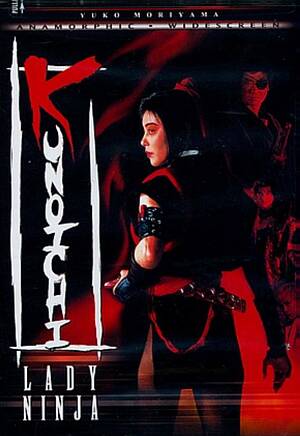 A combination of the seventh and eighth in the series, I believe it’s the first entry (I don’t
A combination of the seventh and eighth in the series, I believe it’s the first entry (I don’t 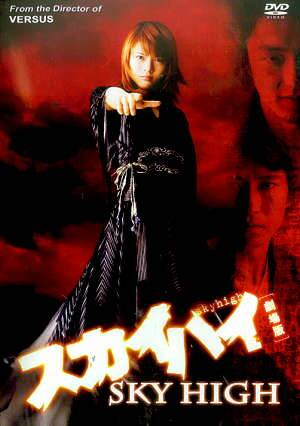 Combining elements from Dead Like Me and Ghost, this still manages to come up with something unique, especially given its origins as a prequel to a popular TV series. It is designed to explain how Mina (Shaku) got the job as Keeper of the Gate, where murder victims must decide whether to forgo revenge and pass on, return to Earth as a ghost, or seek vengeance at the price of eternal torment. She ends up there after having her heart torn out on her wedding day by insane billionaire serial killer Kudo (Osawa) who will stop at nothing to save his one true love, currently lying in a coma. Trust me – it all makes perfect sense, and it’s a particularly nice touch that Mina’s fiance, Detective Kohei (Shosuke) is equally driven in his actions by love.
Combining elements from Dead Like Me and Ghost, this still manages to come up with something unique, especially given its origins as a prequel to a popular TV series. It is designed to explain how Mina (Shaku) got the job as Keeper of the Gate, where murder victims must decide whether to forgo revenge and pass on, return to Earth as a ghost, or seek vengeance at the price of eternal torment. She ends up there after having her heart torn out on her wedding day by insane billionaire serial killer Kudo (Osawa) who will stop at nothing to save his one true love, currently lying in a coma. Trust me – it all makes perfect sense, and it’s a particularly nice touch that Mina’s fiance, Detective Kohei (Shosuke) is equally driven in his actions by love. Director Ichimura returned for the fourth episode, and despite similar problems as the third installment – most obviously, an apparent doubt that Oichi’s character can hold the viewer’s interest by herself – makes a much better stab at things here. Bounty-hunter Oichi finds out what life is like on the other side of the law, after she helps rescue an unwilling bride from a local magistrate; he slaps a 100 gold-piece reward on her head, which naturally, brings other bounty-hunters on her trail, led by Sankuro (Meguro).
Director Ichimura returned for the fourth episode, and despite similar problems as the third installment – most obviously, an apparent doubt that Oichi’s character can hold the viewer’s interest by herself – makes a much better stab at things here. Bounty-hunter Oichi finds out what life is like on the other side of the law, after she helps rescue an unwilling bride from a local magistrate; he slaps a 100 gold-piece reward on her head, which naturally, brings other bounty-hunters on her trail, led by Sankuro (Meguro).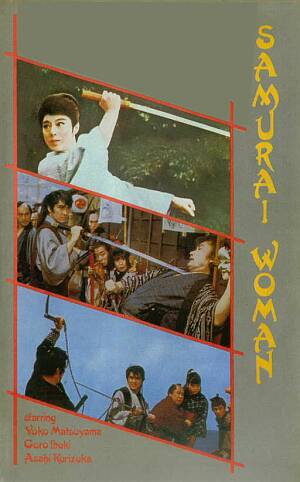 The third entry in the series saw a new director, and unfortunately, a marked turn for the worse, largely because the focus drifts off Oichi. It starts briskly enough, with the heroine coming into possession of a new, effective formula for gunpowder, something barely known at the time in Japan. Understandably, this makes her the focus of attention, in particular for a group with an interest in profiting from the discovery.
The third entry in the series saw a new director, and unfortunately, a marked turn for the worse, largely because the focus drifts off Oichi. It starts briskly enough, with the heroine coming into possession of a new, effective formula for gunpowder, something barely known at the time in Japan. Understandably, this makes her the focus of attention, in particular for a group with an interest in profiting from the discovery.
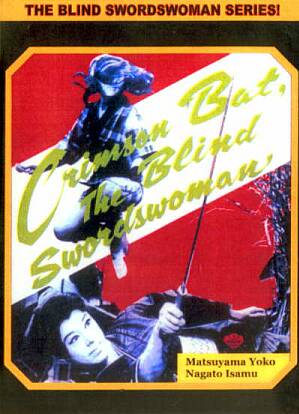 We meet our heroine Oichi as a young child, who has just been being abandoned by her mother – not sure what happened to father, but we later discover Mom’s a prostitute, so can probably fill in the blanks ourselves. To make matters worse, the tree under which Oichi takes shelter from a storm is struck by lightning, rendering her totally blind, in a way that’s – probably wisely – left medically unexplained. However, she is then taken in by a kind gentleman, who brings her up, and on into adulthood.
We meet our heroine Oichi as a young child, who has just been being abandoned by her mother – not sure what happened to father, but we later discover Mom’s a prostitute, so can probably fill in the blanks ourselves. To make matters worse, the tree under which Oichi takes shelter from a storm is struck by lightning, rendering her totally blind, in a way that’s – probably wisely – left medically unexplained. However, she is then taken in by a kind gentleman, who brings her up, and on into adulthood.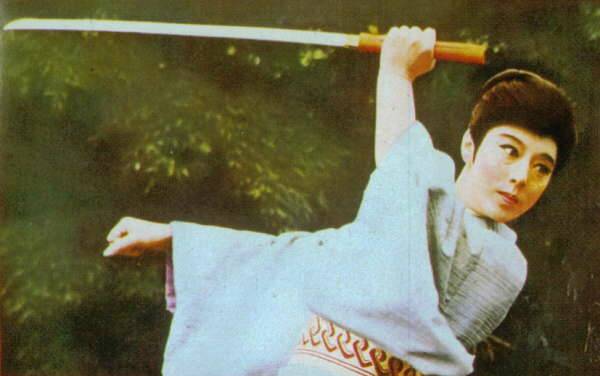 “Up to bat…”
“Up to bat…”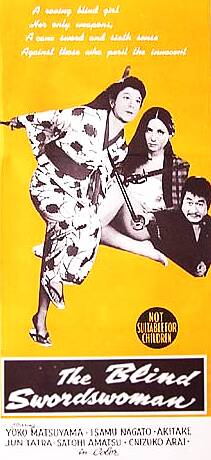 While the samurai is one of the most common archetypes in Japanese cinema, the female version is about as rare as the female gunslinger. Although none of these women reached anything like the popularity of Zatoichi – 26 films starring Shintaro Katsu alone, never mind the recent Takeshi Kitano version – there have been a few that have attempted to break the mould. Azumi and The Princess Blade have both achieved cult status in the West, assisted by Tarantino’s take in Kill Bill, Volume 1. Back in 1973, there was Lady Snowblood, which was successful enough to merit a sequel the following year, but so far, only one samurai-ess series has survived more than two outings.
While the samurai is one of the most common archetypes in Japanese cinema, the female version is about as rare as the female gunslinger. Although none of these women reached anything like the popularity of Zatoichi – 26 films starring Shintaro Katsu alone, never mind the recent Takeshi Kitano version – there have been a few that have attempted to break the mould. Azumi and The Princess Blade have both achieved cult status in the West, assisted by Tarantino’s take in Kill Bill, Volume 1. Back in 1973, there was Lady Snowblood, which was successful enough to merit a sequel the following year, but so far, only one samurai-ess series has survived more than two outings.